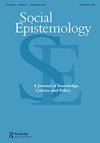设计跨学科对话的专家设置:文学文本作为边界对象
IF 2
2区 哲学
Q1 HISTORY & PHILOSOPHY OF SCIENCE
引用次数: 0
摘要
虽然文学经常被用作跨学科例子和插图的来源,但文学研究在跨学科交流中往往代表性不足。也许原因在于缺乏对文学研究专业知识的真正理解,以及它如何在跨学科环境中发挥作用。在本文中,我建议通过4E认知的概念来概述文学学者的专业知识,并就这些专业知识如何在跨学科对话中成功塑造专家社会认知的认识共同点提出建议。文学主要通过语言风格、叙事设计及其与其他文本的联系来涉及元认知,文学学者有专业知识,通过对文学文本的分析和解释,以一种非模仿的方式,准确地阐述元认知是如何起作用的。文学学者的这种特殊的专业知识和实践使得文学文本在跨学科对话中通过共享的认知共同点被提出作为边界对象。对于这个论点,我建立在早期关于4E认知和预测处理的理论工作以及我在该模型上举办跨学科研讨会的经验之上。本文章由计算机程序翻译,如有差异,请以英文原文为准。
Designing an Expert-Setting for Interdisciplinary Dialogue: Literary Texts as Boundary Objects
While literature is often used as a source of examples and illustrations across disciplines, literary studies tends to be underrepresented in interdisciplinary exchanges. Perhaps the reason lies in a lack of understanding what actually is the expertise of literary studies and how this can be useful in interdisciplinary settings. In this article, I propose to outline the expertise of literary scholars through concepts of 4E cognition and to devise a proposal for how such expertise could successfully shape the epistemic common ground of social cognition of experts in interdisciplinary dialogue. Literature involves metacognition centrally through its language style, the design of the narrative and its links to other texts, and literary scholars have the expertise in formulating exactly how this works – in a non-mimetic way – through the analysis and interpretation of literary texts. This very particular expertise and practice of literary scholars enables literary texts to be proposed as a boundary object in interdisciplinary dialogues through a shared epistemic common ground. For this argument, I build on earlier theoretical work in 4E cognition and predictive processing and my experience running interdisciplinary workshops on that model.
求助全文
通过发布文献求助,成功后即可免费获取论文全文。
去求助
来源期刊

Social Epistemology
Multiple-
CiteScore
2.60
自引率
17.60%
发文量
60
期刊介绍:
Social Epistemology provides a forum for philosophical and social scientific enquiry that incorporates the work of scholars from a variety of disciplines who share a concern with the production, assessment and validation of knowledge. The journal covers both empirical research into the origination and transmission of knowledge and normative considerations which arise as such research is implemented, serving as a guide for directing contemporary knowledge enterprises. Social Epistemology publishes "exchanges" which are the collective product of several contributors and take the form of critical syntheses, open peer commentaries interviews, applications, provocations, reviews and responses
 求助内容:
求助内容: 应助结果提醒方式:
应助结果提醒方式:


